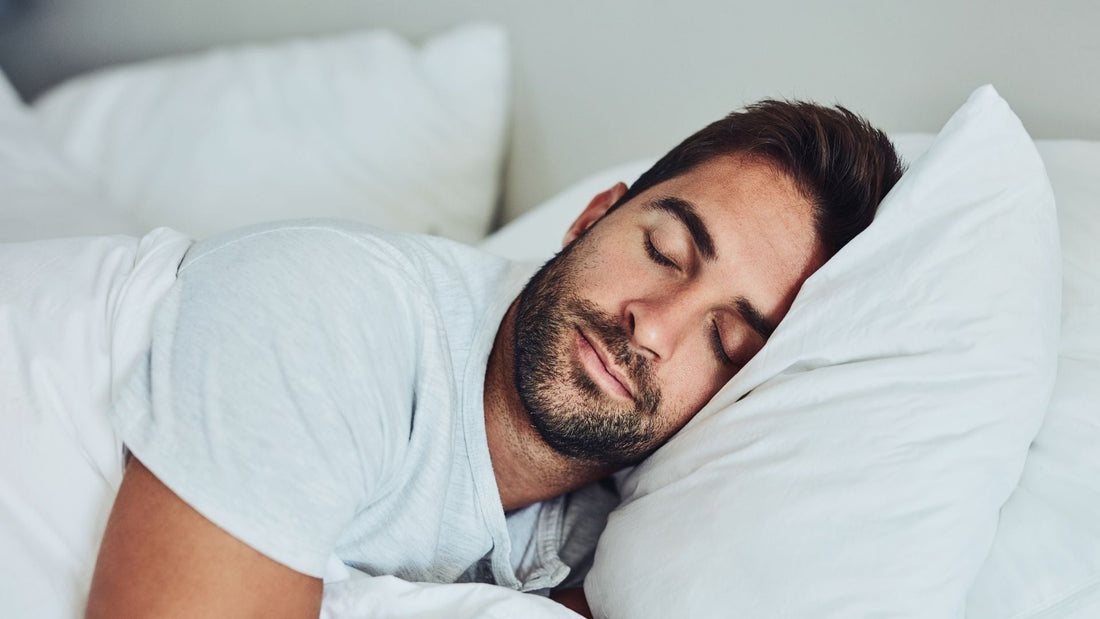Andropause and its impact on men’s sleep
Most of us would like to sleep more and sleep better. We feel better for it and the health benefits are well-documented.1 For many reasons, however, we often just don’t manage those elusive recommended seven to eight hours: there aren’t enough hours in the day, we stay up too late scrolling or watching tv, maybe we have exercised too close to bedtime, might have eaten or drunk too much, are stressed or the inability to sleep could be a side effect of medication or illness. But one thing that rarely gets a mention is the role of testosterone in helping to secure a good night’s rest and it should be a consideration if you are a 40+ man or one who may be going through andropause.
Andropause, is the normal testosterone decline men go through as they age, sometimes misleadingly referred to as the male menopause describes an age-related reduction in testosterone. Unlike the fluctuations and sudden drop in hormone levels experienced by women during the perimenopause and menopause, andropause is marked by a slow and gradual decline in testosterone which can lead to an assortment of symptoms.2 These typically start in a man’s 40s but can begin as early as the late 30s as testosterone levels start to gradually decline. Andropause symptoms typically include lack of energy, loss of muscle mass, changes in mood and decreased libido and/or erectile dysfunction3 but another of the significant effects of this hormonal change is its effects on sleep quality.
The role of testosterone and sleep
Testosterone plays a significant role in regulating sleep. In fact, it is known to have a circadian rhythm (think of this as your body clock or sleep-wake cycle) all of its own - with levels increasing as you sleep, becoming highest in the morning and then decreasing the longer you are awake and at their lowest point in the evenings. Whilst you are asleep, the pituitary glands signals to the brain to produce more testosterone and it’s thought you need seven to eight hours of uninterrupted sleep for those production levels to peak and stay elevated until the morning. To give you an idea of what happens if you get too little sleep in one study involving healthy college-aged men testosterone levels dropped by as much as 10-15 per cent after just one week of sleeping for five hours a night or less. 4
The effects of lowered testosterone on sleep
Fragmented and poor-quality sleep
Lower levels of testosterone can cause changes to your sleep patterns, including difficulty getting to sleep, sleeping less, waking up in the night more and less time spent in slow-wave or deep sleep5 (which is known to play a key role in memory and immune function).
Reduced REM sleep
Ageing and testosterone deficiency have been linked to a reduction in Rapid Eye Movement – or REM – sleep, the phase associated with dreaming and cognitive function. Usually, four to six cycles of REM sleep occur at intervals of approximately 90 minutes becoming longer and increasingly frequent over the course of the night. Whilst all sleep is important, during this stage emotional experiences are processed and memories are consolidated but, most importantly, the brain rests and repairs itself. When you have had sufficient REM sleep you should wake up refreshed and alert, if you haven’t you are liable to feel not only tired but find it difficult to concentrate and/or remember things.6
Night sweats and hot flushes
They might be the most recognized symptom of female menopause but hot flushes are not just a problem for women. Low testosterone in men is also associated with hot flushes7 and they are generally experienced in the same way for both: a sudden intense feeling of warmth and flushing generally accompanied with profuse sweating and sometimes heart palpitations. They are also more common at night and can, understandably, disrupt sleep. The condition sleep apnoea – or the most common type known as Obstructive Sleep Apnea or OSA (see below) is also known to cause nocturnal sweating if left untreated – with around one third of men affected by the condition reporting this side effect.8 Common medications including some antidepressants are known to cause night sweats and consuming things like caffeine, alcohol and spicy food can also increase sweating and trigger flushes.
Sleep apnoea
This is a serious condition which causes your breathing to stop and start repeatedly whilst you sleep. Not only does this then make you feel exhausted during the day and make it hard to concentrate it is known to put sufferers at an increased risk of having a stroke. Being overweight, particularly if you are carrying extra weight around your neck, can increase your chances of having sleep apnoea. Plus because sleep apnoea disrupts the quality and amount of sleep you are getting so it causes testosterone levels to fall. Once sleep apnoea is treated, testosterone levels tend to rise as you start to sleep better.9
How to address sleep issues in andropause
Lifestyle changes
Losing weight, exercising more, getting into a sleep routine, managing stress (which pushes up levels of the stress hormone cortisol and is known to interfere with testosterone production), giving up smoking, eating a healthier diet and drinking less alcohol, getting treatment for sleep apnoea if needed should all help to regulate testosterone levels and improve the quality of your slumber. Often these lifestyle adjustments might be all it takes to both balance your testosterone levels and improve your sleep.
Testosterone replacement therapy
Testosterone replacement therapy (TRT) may be prescribed if you have had your hormone levels checked by a doctor and have an official diagnosis of low testosterone. TRT is available in tablets, gel, pellets implanted under the skin or given as an injection.10 Benefits include improving sex drive, mood, muscle mass and bone strength.
As with any medication, TRT is not without side effects and there is some evidence to suggest it may contribute to, or worsen, sleep apnea. An Australian study found it worsened the condition for around 18 weeks until the participants returned to their normal testosterone levels. This is why doctors recommend treating sleep apnoea first to see if hormone levels return to a healthier level without TRT. Scientists agree, however, that more research is need in this area as evidence is ambiguous with some suggesting short term high doses of TRT might worsen OSA whilst low dose TRT might improve it. 11
Manage sleep apnoea
If your doctor or sleep specialist thinks you might have sleep apnea they might refer you to a specialist sleep clinic. You are then likely to be given devices which monitor your breathing and heartbeat whilst you sleep. Sometimes the condition can be managed by making lifestyle adjustments like losing weight, stopping smoking and/or drinking less alcohol. The condition is also generally helped by using a CPAP machine which gently pumps air into a mask you wear over your face to help improve your breathing and sleep quality. 12
Keep to a consistent sleep schedule
Sleep experts recommend developing a nightly wind down routine and trying to stick to going to bed and getting up at roughly the same time every day. By doing this your body becomes accustomed to feeling sleepy at that designated time and you are more likely to get to sleep quickly, stay that way and wake up feeling refreshed. Similarly making sure your bedroom is designed for maximum quality sleep- no tv, no screens, investing in black-out blinds or curtains and is not too hot or cold – should also help enhance sleep. That said, having a bit of a lie in at the weekends does appear to be beneficial however – with one small study showing a few nights of catch up sleep of over 10 hours increased testosterone levels in healthy men.13
Diet and supplements
What you eat and drink, and when, can have an effect on how well you sleep. Eating and/or drinking too close to bedtime can potentially give you indigestion or heartburn and drinking alcohol may get you off to sleep initially but you won’t sleep as deeply and will probably wake up in the middle of the night or early morning. Certain foods and drinks can help induce drowsiness such as chicken, rice, lettuce, kiwi fruits, nuts and drinks like warm milk, tart cherry juice or chamomile tea. Supplements containing hormone regulating minerals and vitamins and soporific botanicals including magnesium, saw palmetto, hops, chamomile, lavender, cherry extract and stress-relieving ashwagandha should also help.
References
- https://newsinhealth.nih.gov/2013/04/benefits-slumber
- https://pubmed.ncbi.nlm.nih.gov/20554979/
- https://www.nhs.uk/conditions/male-menopause/
- https://www.ncbi.nlm.nih.gov/pmc/articles/PMC4445839/
- https://www.ncbi.nlm.nih.gov/pmc/articles/PMC2453053/
- https://www.sleepfoundation.org/stages-of-sleep/rem-sleep
- https://pubmed.ncbi.nlm.nih.gov/19222468/
- https://bmjopen.bmj.com/content/3/5/e002795
- https://www.sleepfoundation.org/physical-health/sleep-and-testosterone#:~:text=A%20number%20of%20studies%20have,OSA%20may%20increase%20testosterone%20levels.
- https://www.ncic.nhs.uk/patients-visitors/patient-information-leaflets/Testosterone-replacement-therapy
- https://www.frontiersin.org/journals/reproductive-health/articles/10.3389/frph.2023.1219239/full
- https://www.nhs.uk/conditions/sleep-apnoea/
- https://pubmed.ncbi.nlm.nih.gov/25683266/

